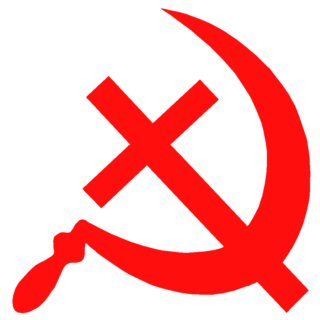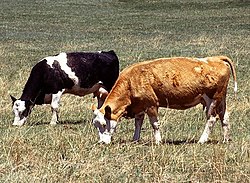In economics, a free market is an economic system in which the prices of goods and services are determined by supply and demand expressed by sellers and buyers. Such markets, as modeled, operate without the intervention of government or any other external authority. Proponents of the free market as a normative ideal contrast it with a regulated market, in which a government intervenes in supply and demand by means of various methods such as taxes or regulations. In an idealized free market economy, prices for goods and services are set solely by the bids and offers of the participants.
State capitalism is an economic system in which the state undertakes business and commercial economic activity and where the means of production are nationalized as state-owned enterprises. The definition can also include the state dominance of corporatized government agencies or of public companies in which the state has controlling shares.

An ethnic stereotype, racial stereotype or cultural stereotype involves part of a system of beliefs about typical characteristics of members of a given ethnic group, their status, societal and cultural norms. A national stereotype, or national character, does the same for a given nationality. The stereotyping may be used for humor in jokes, and/or may be associated with racism.
Bolshevism is the state ideology of the Soviet Union. It is a revolutionary socialist current of formerly Leninist and later Soviet Marxist–Leninist political thought and political regime associated with the formation of a rigidly centralized, cohesive and disciplined party of social revolution, focused on overthrowing the existing capitalist state system, seizing power and establishing the "dictatorship of the proletariat".

Council communism is a current of communist thought that emerged in the 1920s. Inspired by the November Revolution, council communism was opposed to state socialism and advocated workers' councils and council democracy. It is regarded as being strongest in Germany and the Netherlands during the 1920s.
Red-baiting, also known as reductio ad Stalinum and red-tagging, is an intention to discredit the validity of a political opponent and the opponent's logical argument by accusing, denouncing, attacking, or persecuting the target individual or group as anarchist, communist, Marxist, socialist, Stalinist, or fellow travelers towards these ideologies. In the phrase, red refers to the color that traditionally symbolized left-wing politics worldwide since the 19th century, while baiting refers to persecution, torment, or harassment, as in baiting.

Christian communism is a theological view that the teachings of Jesus compel Christians to support religious communism. Although there is no universal agreement on the exact dates when communistic ideas and practices in Christianity began, many Christian communists argue that evidence from the Bible suggests that the first Christians, including the Apostles in the New Testament, established their own small communist society in the years following Jesus' death and resurrection. Many advocates of Christian communism and other communists, including Karl Kautsky, argue that it was taught by Jesus and practised by the apostles themselves. This is generally confirmed by historians.

An economic system, or economic order, is a system of production, resource allocation and distribution of goods and services within a society. It includes the combination of the various institutions, agencies, entities, decision-making processes, and patterns of consumption that comprise the economic structure of a given community.
Romanian humour, like many other Romanian cultural aspects, has many affinities with four other groups: the Latins, the Balkan people, the Germans and the Hungarians.

Criticism of socialism is any critique of socialist economics and socialist models of organization and their feasibility, as well as the political and social implications of adopting such a system. Some critiques are not necessarily directed toward socialism as a system but rather toward the socialist movement, parties, or existing states. Some critics consider socialism to be a purely theoretical concept that should be criticized on theoretical grounds, such as in the economic calculation problem and the socialist calculation debate, while others hold that certain historical examples exist and that they can be criticized on practical grounds. Because there are many types of socialism, most critiques are focused on a specific type of socialism, that of the command economy and the experience of Soviet-type economies that may not apply to all forms of socialism as different models of socialism conflict with each other over questions of property ownership, economic coordination and how socialism is to be achieved. Critics of specific models of socialism might be advocates of a different type of socialism.
Anarchism is generally defined as the political philosophy which holds the state to be undesirable, unnecessary and harmful as well as opposing authority and hierarchical organization in the conduct of human relations. Proponents of anarchism, known as anarchists, advocate stateless societies based on non-hierarchical voluntary associations. While anarchism holds the state to be undesirable, unnecessary and harmful, opposition to the state is not its central or sole definition. Anarchism can entail opposing authority or hierarchy in the conduct of all human relations.
Russian political jokes are a part of Russian humour and can be grouped into the major time periods: Imperial Russia, Soviet Union and post-Soviet Russia. In the Soviet period political jokes were a form of social protest, mocking and criticising leaders, the system and its ideology, myths and rites. Quite a few political themes can be found among other standard categories of Russian joke, most notably Rabinovich jokes and Radio Yerevan.
An economic ideology is a set of views forming the basis of an ideology on how the economy should run. It differentiates itself from economic theory in being normative rather than just explanatory in its approach, whereas the aim of economic theories is to create accurate explanatory models to describe how an economy currently functions. However, the two are closely interrelated, as underlying economic ideology influences the methodology and theory employed in analysis. The diverse ideology and methodology of the 74 Nobel laureates in economics speaks to such interrelation.
Articles in social and political philosophy include:
-ism is a suffix in many English words, originally derived from the Ancient Greek suffix -ισμός (-ismós), and reached English through the Latin -ismus, and the French -isme. It is used to create abstract nouns of action, state, condition, or doctrine, and is often used to describe philosophies, theories, religions, social movements, artistic movements, lifestyles, behaviors, scientific phenomena, or medical conditions.

Corporatism is a political system of interest representation and policymaking whereby corporate groups, such as agricultural, labour, military, business, scientific, or guild associations, come together on and negotiate contracts or policy on the basis of their common interests. The term is derived from the Latin corpus, or "body".
Types of socialism include a range of economic and social systems characterised by social ownership and democratic control of the means of production and organizational self-management of enterprises as well as the political theories and movements associated with socialism. Social ownership may refer to forms of public, collective or cooperative ownership, or to citizen ownership of equity in which surplus value goes to the working class and hence society as a whole. There are many varieties of socialism and no single definition encapsulates all of them, but social ownership is the common element shared by its various forms Socialists disagree about the degree to which social control or regulation of the economy is necessary, how far society should intervene, and whether government, particularly existing government, is the correct vehicle for change.

The New Economic Policy (NEP) was an economic policy of the Soviet Union proposed by Vladimir Lenin in 1921 as a temporary expedient. Lenin characterized the NEP in 1922 as an economic system that would include "a free market and capitalism, both subject to state control", while socialized state enterprises would operate on "a profit basis".

World revolution is the Marxist concept of overthrowing capitalism in all countries through the conscious revolutionary action of the organized working class. For theorists, these revolutions will not necessarily occur simultaneously, but where and when local conditions allow a revolutionary party to successfully replace bourgeois ownership and rule, and install a workers' state based on social ownership of the means of production. In most Marxist schools, such as Trotskyism and Communist Left, the essentially international character of the class struggle and the necessity of global scope are critical elements and a chief explanation of the failure of socialism in one country.
Crowd Cow is an American online meat delivery marketplace. It connects fisheries and ranchers who raise livestock with consumers who want to buy meat.








